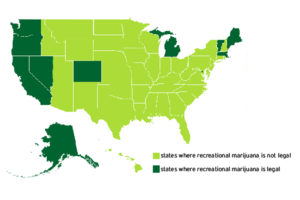Reaping the Rewards of Legalizing Marijuana
With the benefits far outweighing the risks, it’s high time that recreational marijuana is legalized in the United States.
PHOTO | Wikimedia Commons
There are multiple benefits to legalizing both recreational and medical marijuana.
Starting with Colorado in 2014, the push for the legalization of recreational marijuana in the United States has only been increasing. Since then, nine other states have followed suit, as well as Washington D.C.
While the list of states that have legalized the recreational use of marijuana continues to grow, so does the debate over whether or not legalization is a good idea. There are some risks associated with making the recreational use of cannabis legal. However, the potential benefits far outweigh the possible consequences.
As proved by the criminality of alcohol in the prohibition era, making something illegal doesn’t necessarily mean that people are going to follow the law. Similar to the $11 billion lost to tax revenue when alcohol became illegal, the government spends $20 billion a year enforcing laws against marijuana, according to a study done by Harvard University. By legalizing, and therefore taxing the marijuana industry, the government would not only eliminate this cost but be able to make a profit of $132 billion, as well as creating roughly one million jobs. Jobs would come in the form of the growing, selling, business ownership and other aspects of marijuana production. In terms of money, the government stands to gain far more than it would lose when it comes to legalizing recreational marijuana.
As it is with any illicit drug, safety is a large concern for those opposed to legalizing recreational marijuana. However, marijuana is safer than legal drugs, such as tobacco and alcohol, according to the Huffington Post. There have been no reported deaths due to an overdose of cannabis, unlike the six deaths per day due to alcohol poisoning, according to the Drug Enforcement Administration.

The State of Marijuana
Legal drugs like nicotine and alcohol both pose a greater risk than marijuana. Nicotine is an addictive substance that, when paired with tobacco, can cause cancer. Simply by itself, long term exposure to nicotine is linked to the risk of heart attacks and strokes, according to Consumer Reports. Alcohol can lead to liver disease, heart disease and alcoholism.
While smoking marijuana can lead to lung and throat damage, this can be eliminated by different methods of consumption. Excessive use of marijuana can lead to memory problems. However, by itself, marijuana poses far less of a risk than other legal drugs.
Even though there are no recorded cases of a marijuana overdose, marijuana is currently listed as a “schedule I” drug on the controlled substances act by the federal government, meaning that it has a high potential for abuse. This ranking puts marijuana at the same ranking as heroin, and above drugs such as cocaine and meth, despite being safer.
States that have already legalized the recreational use of marijuana have begun to feel the positive effects. After legalization, Colorado collected $135 million in taxes and saw $996 million spent in the industry, according to Investopedia. In addition to that, 18,000 jobs were created in the industry in the year after legalization. As well as creating jobs, arrests of adults for possession of marijuana would no longer be a priority for police, freeing up their time to pursue other more important matters. As it is, someone is arrested each minute for possession of marijuana, according to the American Civil Liberties Union. These people are not drug lords, but instead people who only have a small amount of marijuana on them. The current system groups those who are only in possession of a small amount of cannabis with criminals who are selling much harder and dangerous drugs.
As well as allowing law enforcement to relocate their energy outside of marijuana-related arrests, legalizing recreational marijuana would curb the amount of race-related drug charges. Although both white and black people are equally as likely to use marijuana, black Americans are twice as likely to be arrested for possession, according to both the ACLU and VOX. These unfair statistics prove that legalization would be a step forward in eliminating arrests where racial bias is involved.
The criminalization of marijuana does more harm than good. Without regulations, those who choose to use face dangers of their cannabis being laced with more harmful drugs. In Ohio, three people overdosed when the marijuana they used was unknowingly laced with fentanyl, according to the Metro. Legalizing cannabis would not only put regulations onto the production and selling of the drug but also increase awareness of how to safely consume it.
All in all, legalizing recreational marijuana would do far more good than harm. Keeping the use of recreational marijuana illegal will only hurt the United States in the long run. Economically and socially, the United States stands to benefit from the creation of jobs, tax revenue and a decrease in drug-related arrests. The United States will be able to free up the resources that currently go towards marijuana arrests, create jobs, be able to tax and make money off of a completely new industry,
This editorial reflects the views of the Le Journal staff. Twelve out of 20 members voted in favor of this editorial.



